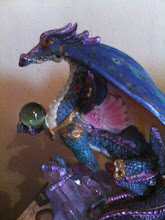How I have ached to ask greengrocers why the apples possess 52p. Did they earn it by being so darn juicy and tasty?
Because education in most of the English-speaking world is centered on making children feel good about themselves, mostly by allowing them to threaten teachers and walk school corridors like they own the place, any attempt to teach correctly written English is a diversity-hating, mean-spirited attack on the little darlings. Telling them to put an apostrophe in the right place will inevitably be met with a cry of "Why do I gotta do that?" (And you can't expect them to know that "have" is the correct verb in this instance.)
People can't even spell a simple word like "yeah" anymore. Instead, it's "ya," which looks moronic, but it certainly fits in with the times, don't it?
Now, I don't mind double negatives, the word "ain't" (which has its place in great literature), or spellings like "oughta," "gotta", "gonna," etc. I don't mind slang, because it has always existed and a lot of it dies off as young people become adults and join the working world. The '60s gave us a lot of good words that are still with us to this day and I'm grateful for them. I don't talk like William F. Buckley. My speech is heavy on the Northeast accent, with all the nasalness that implies. I just want some semblance of order to our shared language.
I bring all this up because Devon, in the southwest of England, recently proposed banning the apostrophe from place names. For instance, King's Cross Road would have become "Kings Cross Road." Which, if you're familiar with English, doesn't take a degree in rocket science to know looks strange and confusing. Yet, here's the kicker: Devon originally considered the anti-apostrophe proposal because they thought that the punctuation mark causes "potential confusion."
The language being in the hands of progressive twits who want to simplify everything in existence such as it is, it is argued that the apostrophe makes English look too messy. Nearly every other language you can name has accent marks. French, for instance, has the cedilla, circumflex, acute accent, grave accent and diaresis. And, golly gee, it even has the apostrophe. Who thinks French looks messy? I think French looks as beautiful as it sounds. I wonder how French kids manage with so many marks in their language? Life must be very tough for them, because the French actually care about their tongue.
Anyone want to bring the French up before the European Union Court of Human Rights? Strangely enough, that hasn't happened. What does it say about English-speakers that they think they can't handle the simplest of punctuation rules?
It is thought that English is one of the toughest languages to learn, mostly due to inconsistent spelling rules—not our fault; you can blame the Normans for that—and turns of phrase that rival Yiddish sayings for not being easily translatable. You just have to know them. Think about the extra burden on EFL students who are taught one thing in school—proper English—and are shown another with the garbage they regularly read on-line and sloppy e-mails from so-called native English speakers.
We appear to have made English even tougher than it already is. No wonder new Hispanic arrivals to the U.S. want to cling to Spanish.
The English have a long history of cutting out the apostrophe in business names. The book-seller (of all people) Waterstone's changed its name to Waterstones. There are countless other examples, but I shop at the supermarket Sainsbury's which still keeps its apostrophe. It's difficult to believe, but even McDonald's comes off as looking intelligent. I have just found something to admire about a fast-food franchise. Mercy!
Luckily, the outcry over the war declared on the apostrophe in Devon caused councillors to re-think the issue and reverse their decision. Former Devon council member Charles Noon was among those upset by the proposal. Noon said that a written sentence such as "if you're late for dinner, you can eat your son's" without the apostrophe would suggest cannibalism.
Methinks, however, that Noon assumes too much quality learning on the part of the averge Simon or Simone to be able to write "you're" instead of the all-purpose "your" (or "ur") or to put a comma between "dinner" and "you."
And how long before we decide commas are "too messy" and unnecessary? Hell, why even put spaces between words? Think of the expediency—and unnecessary burden on all our young keyboard users—in ignoring the space key? It's a serious question considering anything other than letters themselves are seen as superfluous in this day and age.
Why even have letters? Let's just go back to runes. We can have a set of ten runes and that won't tax the minds of our precious young 'uns.
Isn't it enough that we have a war on drugs, a war on terror, a war on poverty? We have to add apostrophes to that list? How about a war on bad education? Why can't we ever propose that?
In the meantime, don't come looking for my apostrophes. You'll have to pry them from my cold, dead hands.





No comments:
Post a Comment